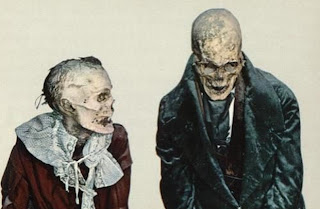A question has been haunting me for a few weeks now. I have a wonderful life. A wonderful Job. A wonderful home. A wonderful wife. I serve a wonderful God. I fellowship at a wonderful church.
So where has all the joy gone?
To be sure, I’m not depressed. I’m not even unhappy. But occasionally I notice a low level of anxiety that, relative to the blessings in my life, just doesn’t add up.
Joy, says Bill Johnson, is such a priceless commodity that Jesus was prepared to endure the cross for it. “Look to the Lord and his strength” writes the Psalmist, “seek his face always” (Ps 105:4). Yet somehow I seem tuned to a different wavelength a lot of the time.
Life – even since I got rid of my satellite dish – remains insanely cluttered.
Just this week, Santam and Nandos squared off in what can only be described as a self indulgent advertising slug-fest. In my amateur opinion, it was just too clever not to have been staged – but that’s for another day. If you must, check out the work here. Don’t get me wrong, as a marketing case study, the Nandos/Santam standoff is about as good as it gets. As a marketer I doff my cap to the team responsible.
My point is this: even without a television, the commercials insinuated their way into my life through Twitter and Facebook. They even became the subject of a coffee station conversation that lasted way too long – given that we were only talking about a few TV ads.
Seriously, since when did advertising begin to pass for entertainment? Why do more people watch the Super Bowl for the ads than they do for the game itself?
Naomi Klein laments this very thing in her book “No Logo”. Part 1 of the book – aptly entitled “No Space” - reflects on how far we have surrendered the things we hold most dear to advertisers – our schools, our neighbourhoods, our landscapes, our architecture – our very culture.
In a provocative piece entitled “Confessions of a middle-aged marketing consultant” Tom Dawson says:
“Do we really need all this advertising and mindless marketing chatter? The amount of media saturation in our modern lives is growing every year, fueling the marketing machine. Seems like anywhere two or more people gather in a conversation or a shared experience there’s a marketer trying to interrupt the conversation”
Controversial artist Banksy goes a step further in his blog post below. It's righteous indignation so I make no apology for the language he uses – I've used such words myself!
Perhaps this, at least in part, accounts for where my joy has gone. A subtle and sinuous matrix envelops us, causing me to take my eye off not only the true source of life but the true inspiration for life. Paul encourages the Philippians to dwell on whatever is true, noble, right and pure. And so while all things are permissible, perhaps not everything (like TV Ads, celebrity worship, sports) is beneficial after all.
I had the privilege of speaking in church yesterday. It was a piece I’d spent weeks thinking about and at least three days writing. As I left the house on my way to the meeting, I considered the unpleasant possibility that whatever I had to say might just be another interruption to an already noisy frequency. If any of you were there to hear it, I trust God would help you be the judge of that. But I leave you with the provocative lyrics of a great Switchfoot song called “Adding to the noise”
What's it gonna take
to slow us down
to let the silence spin us around?
What's it gonna take
to drop this town?
We've been spinning at the speed of sound.
If we’re adding to the noise
Turn off this song
If we’re adding to the noise
Turn off your stereo, radio, video




